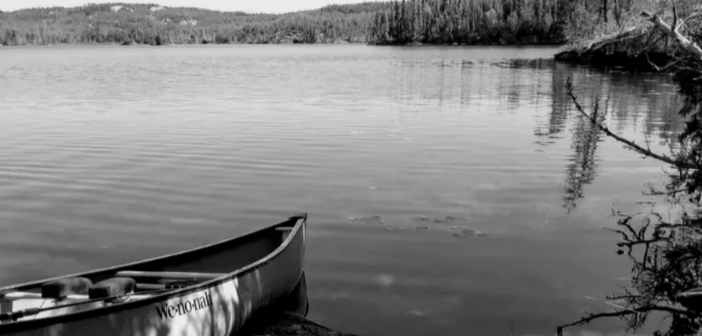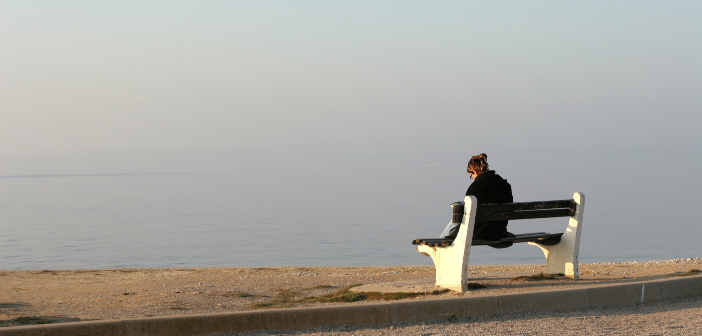I love to fish! Spending time on the bank, or on the water, trying to trick those little rascals into biting my lure is so much fun. In fact, a river near where I live in South Carolina has a wonderful phenomenon that happens every spring. Several species of fish run up the river from the lake to spawn in some shoals a few miles upstream. For nearly two months, there are thousands and thousands of fish preparing to spawn before heading back down to the lake’s open waters. And they bite like crazy! It is not uncommon to catch a fish on virtually every cast you make.
I must confess that I have a sickness that plagues me whenever I go fishing. It might be possible that you have it too. I like to call it “discontent disease.” It manifests almost every time I fish. Here’s how it works: Any time that I’m fishing on the bank I inevitably want to be fishing in a boat. And whenever I’m fishing in a boat, it seems I always fish near the bank. I constantly want to be where I’m not.
Sharing my problem with you is the backdrop to what led to a tragic event that almost took my life along with my dad.
In an effort to get on the water in late February a few years ago, dad and I decided to take my canoe to the river. It was a really cold day to be on the water so we dressed with heavy clothes and hunting boots in order to try and stay warm. The canoe that we were in was actually designed for the still waters of a lake instead of the flowing current of a river. However, I allowed the “discontent disease” to override common sense and chose to use the canoe anyway.
Within just a few minutes of floating down the river I noticed a dangerous situation approaching. With our focus of tying on lures, we failed to realize that the canoe had turned sideways as we were moving downstream. Suddenly, I caught a glimpse of a huge tree limb from a submerged tree that was sticking out of the water. We were heading straight towards it in the bend of the river. I quickly attempted to paddle the boat around to no avail. It was too late!
We collided with the limb in the exact center of the canoe, which resulted in the canoe capsizing. Both of us were hurled into the freezing water wearing those heavy clothes and boots which instantly absorbed a lot of water. To make matters worse, neither of us were wearing a life-jacket.
For most of my life, I had always played a scenario over in my head of what I would do should I ever be faced with a sudden drowning experience. I thought to myself that I would simply hold my breath, slip off my clothes under water, and then push off the relatively shallow bottom of the river. I knew that the river was only six to eight feet deep in most places. However, much to my surprise, I discovered in this moment of panic that I never touched bottom. (I learned upon a return trip to that spot in the bend of the river that it was eighteen to twenty feet where our canoe flipped!) The terror of this sudden unexpected event was also elevated because I wanted to save my dad.
As the awareness of this predicament settled in, I began to frantically kick my feet as hard as I could trying to reach the surface. However, the thick clothes and boots that I was wearing were hindering any progress to get above water. At this point, I began to take in water as my body desperately needed to breathe. One gulp. Then another. I couldn’t reach the surface even though I was trying with all of my might.
As I took in a third gulp of water, the most amazing thing began to happen. I started to reason that this was going to be the way my life would end. You might think that I would have been frantically freaking out internally. However, that’s not what happened at all. I just relaxed and thought about my wife, Gina, and our three daughters, Tiffany, Hannah, and Lydia. I remember thinking how much I loved them and that I hated to leave them this way.
It was after I had accepted my fate that I was suddenly startled as my head slammed into the capsized canoe. Grabbing the sides of the canoe, I gave one final attempt to break the surface of the water and my head popped above it where I began coughing out the water in my lungs. To my extreme joy, I discovered that dad had also surfaced and was clinging onto the capsized canoe.
Exhausted and freezing, we just held on until the canoe drifted to the other bank where the water was shallow enough for us to climb out of the river and make our way to safety. Making our way back up the river bank to the truck, I kept trying to process what had just happened. I was experiencing feelings of joy, fear, insecurity, and shame all at the same time. But most of all, I just wanted to get home and hug my family really tight!
What’s The Lesson?
Reliving my brush with death from twenty years ago still makes me feel queasy to talk about today. I think this is the first time that I’ve written about the experience in such detail. However, there are some lessons that I took away from that experience which I believe may be helpful to you today as you navigate leading in a world in crisis.
For a lot of us, leading through COVID-19, and now the racial division that has exploded into riots all across America, has left us questioning our ability to lead. As you are tasked with leading your organization through these experiences, I wanted to offer some help that parallels the lessons learned from my near fatal drowning experience. Surviving a near-death event taught me several of the most valuable principles that I have depended upon every day since then.
Do you remember the problem that I shared with you at the beginning of this article? I called it “discontent disease.” I wonder if you might be dealing with it, too. It can manifest in a lot of different ways. Maybe the shutdown caused by the pandemic has created a deep desire in you to just get back to the way things were before it happened. Or possibly you sense a desire to create some form of activity that can serve as a distraction because you don’t have the answers to the division you see in your congregation, community, and even your state.
For many of us as leaders, we allow ourselves to get incredibly busy in order to mask the exposure we are feeling because we aren’t sure what to do or where to go. But as John Maxwell reminded us many years ago, “Activity doesn’t create accomplishment.” In fact, in so many cases, attempting to do whatever we can think of first leads to more problems.
Whether you are navigating the challenging days of reopening after COVID-19 or trying to bring healing and reconciliation to your community, I believe that each of these principles will help to make the process of leading a little easier.
#1 – REALIZE the value of your marriage and family is beyond measure.
I had often wondered what goes through someone’s mind as they accept that death is upon them. As I began to realize that my life may be over, my entire being was flooded with such raw emotion of the love I have for my wife and daughters. Nothing else mattered in that moment.
Honestly, nothing else should ever matter as much to us as our families and our relationship with Jesus. This is so vital in order to help anchor you while you lead through these current storms. At the end of the day, the relationship we have as leaders with our family influences whether or not there is stability in our leadership. Difficult times will either pull us together or tear us apart.
#2 – RECOGNIZE that there are some things that need to be done differently moving forward.
It’s absolutely acceptable to make mistakes. We all do. However, repeating the same mistakes over and over will eventually disqualify us from leading. Looking back, I can make a long list of the mistakes that I made that cold February day. However, I learned from that experience that I never wanted to go through it again.
As you lead in these difficult situations, it is extremely important to take some time for reflection and honest evaluation of how things were going before things came to a halt. You may even need to get outside help from a trusted mentor or other source to help you gain clarity and a firm strategy moving forward. Refusing to take an honest inventory will only perpetuate the problems.
#3 – REMEMBER to not allow the setback to steal your joy.
Failure isn’t final unless you quit! Acknowledging that you need to change isn’t the end of the world. It took me a long time to come to grips with the results of my discontent that almost ended in drowning. Those results soon began manifesting in me through a negative self-image. I was so hard on myself for the mistakes that I made that led to our canoe capsizing. Perhaps you also are losing your joy because of a negative self-image?
As leaders, we are often way too hard on ourselves. For some strange reason, I think many of us feel like we’ve been called to be perfect. I don’t want to burst your bubble, but you aren’t perfect. In fact, the only perfect One died for you and me to forgive all of our imperfections. Therefore, it’s so important that you remember that you are accepted completely in Him. Allow His sacrifice for you to rekindle your joy.
#4 – RECREATION has the power to rescue you when you least expect it.
I believe that one of the most neglected priorities of life by many spiritual leaders is the way they treat their physical bodies. Time and time again, it seems like every answer for the problems we face as leaders is always spiritual, emotional, or mental. These are obviously areas that we can’t ignore. However, it seems that we often relegate our physical man as unimportant.
I bring this up at this point because I believe that the stamina and ability to finally get to the surface of the river was aided greatly by the previous months of exercise that I had been doing. There is no doubt in my mind that I would not have had the physical strength to do it if I had been out of shape.
For so many of us, our discontent comes from ignoring what is right in front of us while we go on these deep searches for a different answer. I’m not dismissing the great value of spiritual disciplines. Yet I wonder if you are dismissing the value of taking care of your physical temple? Your leadership effectiveness will be much more impactful if you prioritize such things as exercise, healthy eating, getting enough sleep, and taking time to be still and reflect.
#5 – RESOLVE within yourself that you will keep on keeping on.
This may come as a surprise to you but I went right back to the river two days after nearly drowning. I asked a friend to go with me and we fished all day from the bank. And as crazy as it sounds, another friend and I went fishing in his canoe two weeks later! Why, you may ask? The answer is simple. I wasn’t going to let this setback define the rest of my life. I’ve been going to the river every spring for as long as I can remember. I had to make a decision to get back down there.
Leader, you will need to have the same resolve as you lead your organization out of these current difficult times. You must make the decision that giving up is not an option no matter how hard it gets. There are so many opportunities that await the leader with resolve. So you don’t have all the answers. Well, neither do I. However, the One who has called us has also equipped us for such a time as this. It’s time for us to turn our setbacks into stepping stones!
The experience of being taken to the brink of death caused me to reexamine everything in my life. I finally began to understand that constantly wanting to be somewhere else was only a symptom of a much deeper issue. The restlessness that had become a part of my leadership eventually manifested in a nasty church split. You see, for so long I was just going through the motions while attempting to ignore some leadership issues that the Lord was pointing out in my life. And just like being capsized in a canoe on a winter’s day, my ministry was turned upside down.
The lesson that we all need to learn from current circumstances is that we cannot continue operating the way we’ve always operated. As the scripture says in Romans 8:18 – 19, “I consider that our present sufferings are not worth comparing with the glory that will be revealed in us. For the creation waits in eager expectation for the children of God to be revealed.” There has to be a manifestation of the leaders in the Church in order for things to be turned around.
Leader, there has never been a better time for you to provide great leadership than now. Even if you have been taken to the brink of ministry death, I can testify that great days are ahead for you if you are willing to make the necessary changes to be effective.
I’m pulling for you. And the world is counting on you, too!







